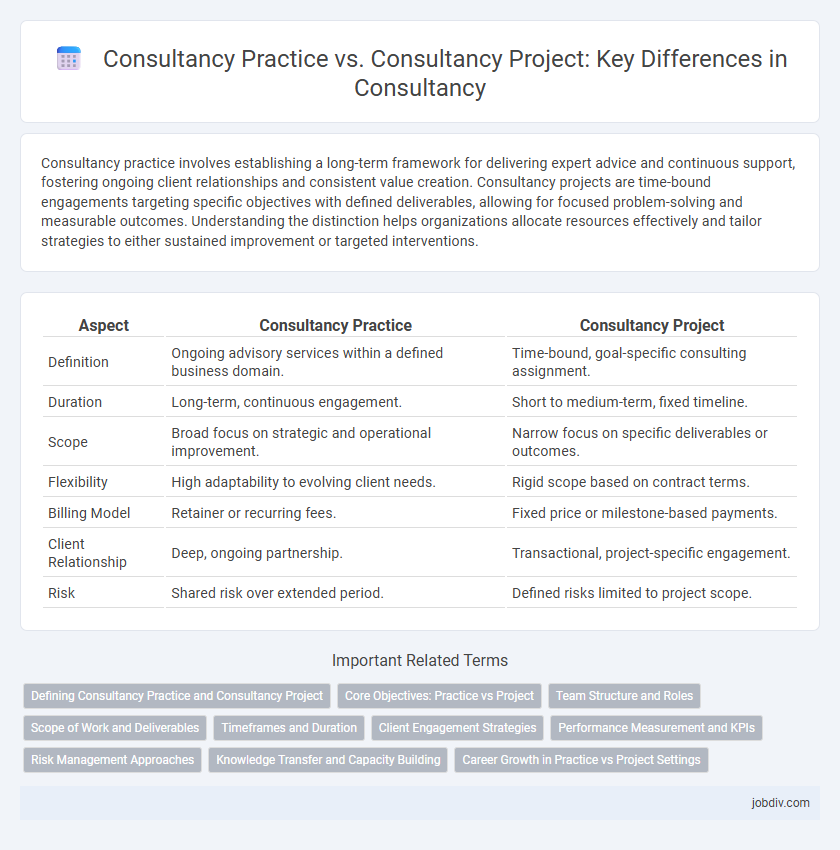Consultancy practice involves establishing a long-term framework for delivering expert advice and continuous support, fostering ongoing client relationships and consistent value creation. Consultancy projects are time-bound engagements targeting specific objectives with defined deliverables, allowing for focused problem-solving and measurable outcomes. Understanding the distinction helps organizations allocate resources effectively and tailor strategies to either sustained improvement or targeted interventions.
Table of Comparison
| Aspect | Consultancy Practice | Consultancy Project |
|---|---|---|
| Definition | Ongoing advisory services within a defined business domain. | Time-bound, goal-specific consulting assignment. |
| Duration | Long-term, continuous engagement. | Short to medium-term, fixed timeline. |
| Scope | Broad focus on strategic and operational improvement. | Narrow focus on specific deliverables or outcomes. |
| Flexibility | High adaptability to evolving client needs. | Rigid scope based on contract terms. |
| Billing Model | Retainer or recurring fees. | Fixed price or milestone-based payments. |
| Client Relationship | Deep, ongoing partnership. | Transactional, project-specific engagement. |
| Risk | Shared risk over extended period. | Defined risks limited to project scope. |
Defining Consultancy Practice and Consultancy Project
Consultancy practice refers to the ongoing, structured deployment of expertise and methodologies within a consultancy firm to deliver consistent value across various client engagements, emphasizing knowledge management, standardization, and continuous improvement. A consultancy project is a specific, time-bound assignment undertaken to solve a particular client problem or achieve defined objectives using the consultancy practice's resources, tools, and frameworks. Defining consultancy practice involves establishing core competencies, service portfolios, and operational processes, whereas defining a consultancy project centers on scope, deliverables, timelines, and client engagement parameters.
Core Objectives: Practice vs Project
Consultancy practice focuses on developing long-term expertise, methodologies, and frameworks that continually enhance service quality and client value across multiple engagements. Consultancy projects are time-bound initiatives aimed at solving specific client challenges or achieving defined outcomes within set parameters. Core objectives of practice emphasize knowledge accumulation and capability building, while projects prioritize deliverables, client satisfaction, and measurable impact.
Team Structure and Roles
Consultancy practice involves a stable team structure with specialized roles such as partners, senior consultants, and analysts who maintain long-term client relationships and develop expertise in specific industries. Consultancy projects assemble cross-functional teams tailored to project scope, including project managers, subject matter experts, and support staff to address specific client challenges within defined timelines. The dynamic composition of project teams contrasts with the consistent, strategic focus of consultancy practices, optimizing resource allocation and expertise application.
Scope of Work and Deliverables
Consultancy practice encompasses the ongoing expertise, methodologies, and frameworks a firm uses to address client challenges, shaping broad strategic approaches over time. Consultancy projects are time-bound engagements with clearly defined scope of work, objectives, and specific deliverables tailored to resolve particular client issues within a set timeline. Scope of work in projects details precise activities and milestones, while deliverables represent the tangible outputs, such as reports, analyses, or implementation plans, produced at project completion.
Timeframes and Duration
Consultancy practice involves ongoing, long-term engagement with clients, allowing continuous improvement and strategic guidance over months or years. Consultancy projects have defined timeframes and specific deliverables, typically ranging from a few weeks to several months. The project duration is fixed to achieve targeted outcomes, while practice spans broader, iterative support and relationship management.
Client Engagement Strategies
Consultancy practice emphasizes building long-term client relationships through tailored engagement strategies that foster trust and continuous collaboration. Consultancy projects focus on delivering specific solutions within defined timelines, requiring precise client communication and milestone tracking to meet project goals. Effective client engagement in both contexts enhances value creation and ensures alignment with client needs and expectations.
Performance Measurement and KPIs
Consultancy practice performance measurement focuses on long-term metrics such as client retention rate, average project profitability, and consultant utilization rates to assess overall business health and growth potential. In contrast, consultancy project KPIs prioritize short-term deliverables like project completion time, budget adherence, and client satisfaction scores to evaluate specific project success. Effective performance measurement integrates both practice-level KPIs and project-specific indicators to ensure aligned strategic outcomes and operational efficiency.
Risk Management Approaches
Consultancy practice in risk management emphasizes developing standardized frameworks and long-term strategies to proactively identify and mitigate potential risks across various industries. Consultancy projects focus on tailored risk assessments and implementing specific mitigation plans to address unique client challenges within defined timelines. Effective risk management approaches balance enterprise-wide best practices with project-specific solutions to optimize resilience and compliance.
Knowledge Transfer and Capacity Building
Consultancy practice emphasizes ongoing knowledge transfer and capacity building by embedding expertise within an organization's processes, enabling sustainable growth. Consultancy projects focus on delivering specific outcomes within a defined timeline, often limiting long-term skill development and organizational learning. Integrating continuous knowledge sharing in consultancy projects enhances capacity building and ensures lasting impact beyond project completion.
Career Growth in Practice vs Project Settings
Career growth within consultancy practice focuses on developing deep expertise and thought leadership in specialized domains, enhancing long-term value for clients and the firm. In contrast, consultancy project settings offer accelerated skill acquisition through diverse, short-term engagements, fostering adaptability and broad business acumen. Professionals balancing both practice and project experiences often achieve optimal career progression by combining strategic insight with practical execution skills.
Consultancy Practice vs Consultancy Project Infographic

 jobdiv.com
jobdiv.com